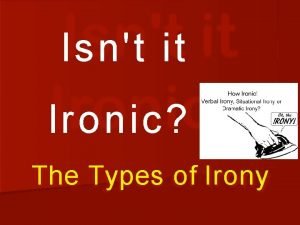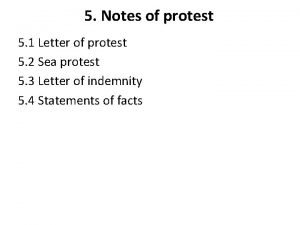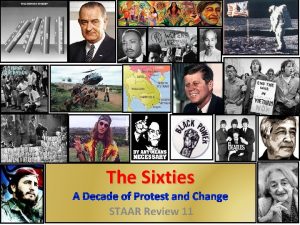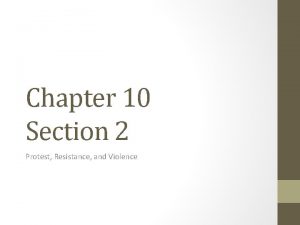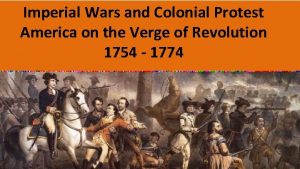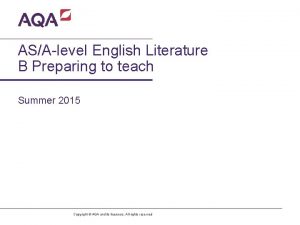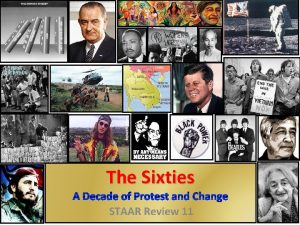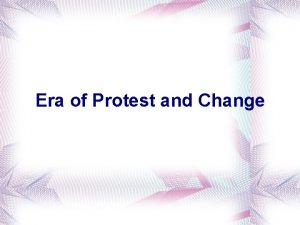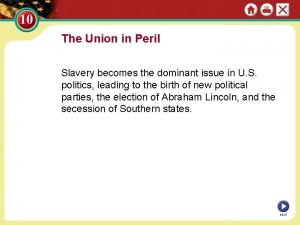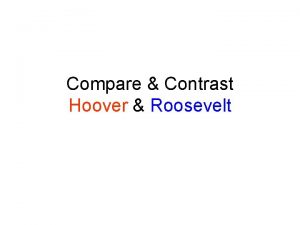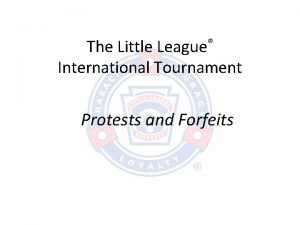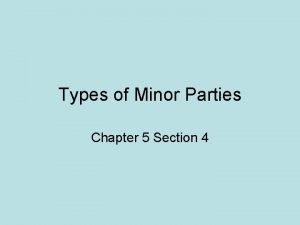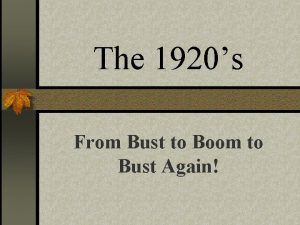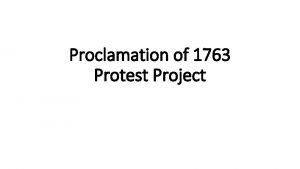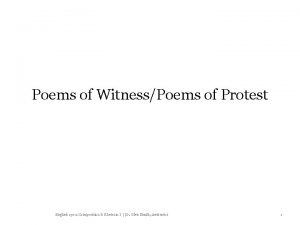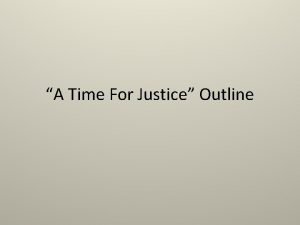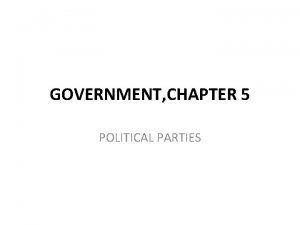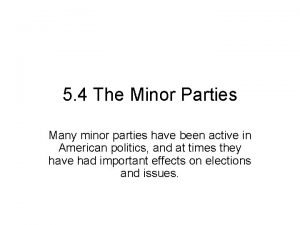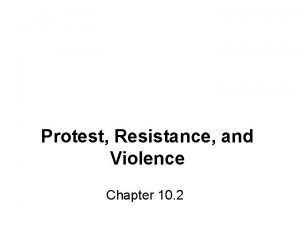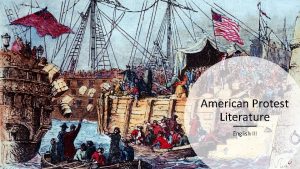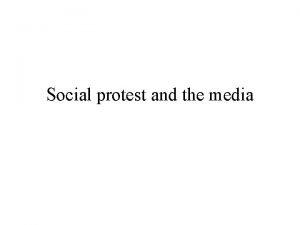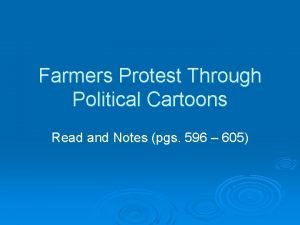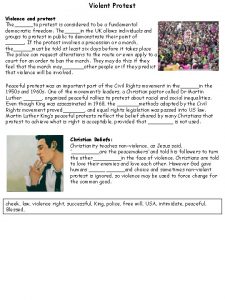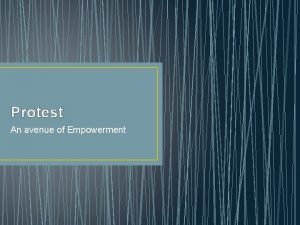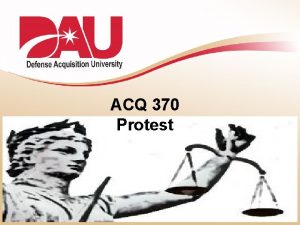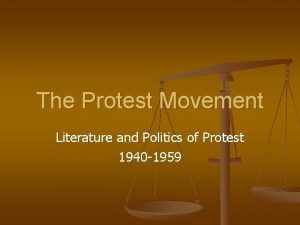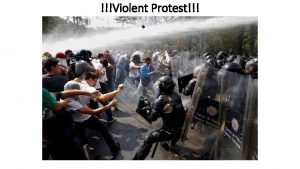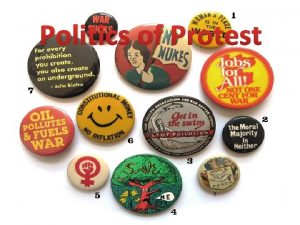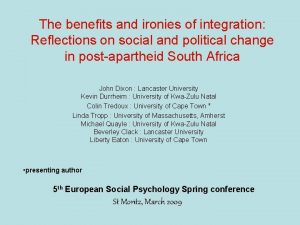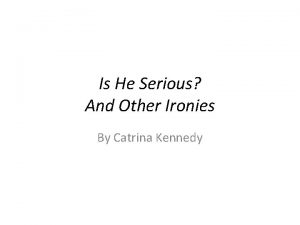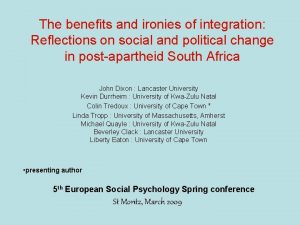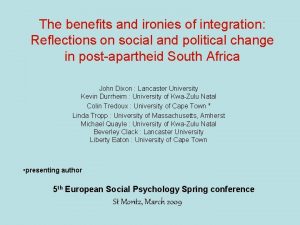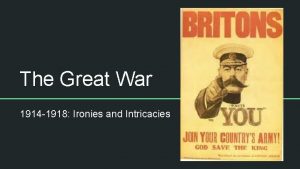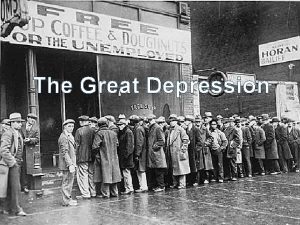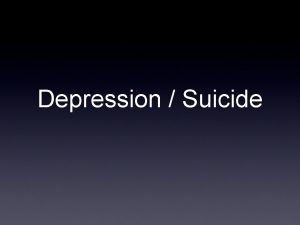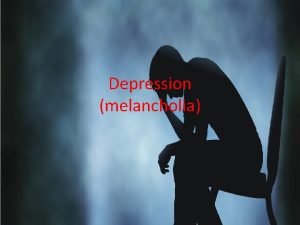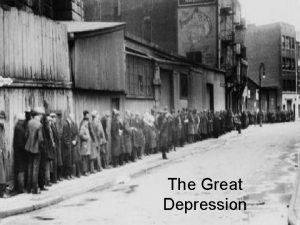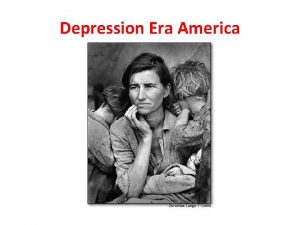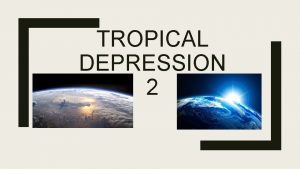Protest Identity and Depression Ironies of Identity Construction











![Growing up in the Colonies “[In South Africa], only one European child in a Growing up in the Colonies “[In South Africa], only one European child in a](https://slidetodoc.com/presentation_image_h2/4315fd544494203bbb8ff8a6aa033d6f/image-12.jpg)















- Slides: 27

Protest, Identity and Depression

Ironies of Identity Construction n On the one hand: - the emergence of new social classes, the growth of urbanization and the extended ‘world’ in which some Africans worked and traveled worked to break down traditional community and ‘ethnic’ identities. n On the other, - the very insecurity of these new situations often caused Africans to re-invent (if not ‘invent’) bonds of so-called tribal affinity.

Ironies of Identity Construction n Moreover, colonial political economy: -often reinforced a sense of ‘tribal’ collectivity through tax structures, land settlements and migration patterns. - encouraged ‘use’ of this identity to gain economic, political advantage n Colonial ethnography took care of the rest!

“Types” Africaines “Specimens of Native Dress” [Rev. W Bentley, Pioneering on the Congo, 1900: 50] [Rev. D Kemp, Nine Years at Gold Coast, 204]

“Types” Africans (cont. ) (left) “Moorish” woman in city attire. (below) Young “Moorish” Woman. (right) Beautiful Fatmah – “Moorish” woman. [Malek Alloula, The Colonial Harem, 1986: 13, 24, 34]

Ironies of Identity… (cont. ) The impact of being both European and African (both ‘white’ and ‘black’) had deep psychological implications as well, as Franz Fanon chronicled in his disturbing work, based on his practice in Algeria. [Franz Fanon, Black Skin, White Masks, New York, 1967]

Ironies of Identity… (cont. ) n One of the ironies of colonialism, however, was the creation of a new European, a ‘colonial’ one. Europeans in Africa became a new ‘tribe’ themselves--through their interactions with Africans -through their fears of Africans -through their doubts about themselves -through their attempts to be African in some new ‘civilized, modern’ way

Ironies of Identity… (cont. ) n Although in a more privileged way, European ‘Africans’ were as hybrid and displaced as those they purported to rule.

Ironies of Identity… (cont. ) South Africa--Boers (Afrikaners): “I have only been an Afrikaner always, but I don’t exactly know what it is, ” said Dominee Jan van Rooyen, chuckling. The main thing, he said is that he is Afrikaans-speaking and has a culture that “differed from the English. ” When he was growing up in the thirties, that was the Nationalists’ political emphasis. But if “you go to England, you find out how English we all are in South Africa. ” June Goodwin and Ben Schiff, Heart of Whiteness: Afrikaners Face Black Rule in the New South Africa. (46)

Ironies of Identity… (cont. ) South Africa—A special case? “The first Oosthuizen came to South Africa in 1691, the third of April. So we’re here for more than three hundred years. My grandchildren are ninth generation. There are many old families that have been here that long, coming mostly from Holland, some from Germany. . . ” June Goodwin and Ben Schiff, Heart of Whiteness: Afrikaners Face Black Rule in the New South Africa. (47)

Ironies of Identity… (cont. ) White Supremacist and African? “We’re a mass of deep conflicts. ” Take Eugene Terreblanche, the neo-Nazi right-wing leader and founder of the African Resistance Movement (Afrikaner Weerstansbeweging, AWB). At first Terreblanche will “tell you all this white supremacy bullshit. ” Then switch off the tape recorder and he will “tell you he’s an African militarist. ” His hero is Shaka Zulu, the Zulu military leader who ravaged other African tribes in central South Africa during the nineteenth century. ” Max du Preez speaking of himself and other Afrikaners, in June Goodwin and Ben Schiff, Heart of Whiteness: Afrikaners Face Black Rule in the New South Africa. (46)
![Growing up in the Colonies In South Africa only one European child in a Growing up in the Colonies “[In South Africa], only one European child in a](https://slidetodoc.com/presentation_image_h2/4315fd544494203bbb8ff8a6aa033d6f/image-12.jpg)
Growing up in the Colonies “[In South Africa], only one European child in a thousand has a European ‘Nanny’. ” This kind of domestic labour employed thousands of south African women. [RHW Shepherd & BG Paver, African Contrasts, 1947: 74]

Identity in a Postcard Written on the card (Algeria): “I am sending you a package to be picked up at the railway station. The babies are doing well; they have just taken a walk by the beach. I shall write you shortly at greater length. Warm kisses to all of you. Martha” [Malek Alloula, The Colonial Harem, 1986: 26]

European Life in Colonial Africa Daily doses of quinine, nights under mosquito nets to prevent malaria (Congo) [NR Hunt, Colonial Lexicon, 245] “The worst and longest puncture” (Geoffery Gorer) [G Gorer, Africa Dances, 1949: 64]

Watershed in the Colonial World There were two major ‘watersheds’ in early ‘colonial world’ -the second linked in many ways to the first, which in turn gave new impetus to Colonialism, - created new roles for the ‘colonial African’. n the Great Depression (1929 -1935) n World War II (1939 -1945)

The 1930 s n. Economic situation arising from the Great Depression revealed degree to which Africa was dependent on healthy functioning of world economy: - Uganda: cotton 80% exports - Gold Coast: cocoa 79% exports - Gambia: peanuts 98% exports - Zanzibar: cloves 61% exports

The 1930 s n Prices for all commodities dropped: - wages cut - colonial governments attempted to ‘recoup’ Europe’s losses from Africans - cuts to education, health, welfare

The 1930 s: for the benefit of…WHO? n. Also became clear: - where profits were made, - bulk of money invested NOT in Africa - but in Europe:

The 1930 s: for the benefit of…WHO? - Northern Rhodesia: 1937 more than 4 million pounds in profits, 540, 000 pounds returned to country through taxes but colony was “too poor” to afford schools.

The 1930 s: for the benefit of…WHO? - Gold Coast: 1920 s-1949 more than half of all profits from mineral exports went directly to Britain yet colony had only one higher education institution (Achiomota College, 1924) - most companies foreign owned therefore profits ‘profited’ Europe not Africa

Development for …? “Population, Area, Trade and Investment: A comparison” (produced for official purposes during the war) [French Equatorial Africa and the Cameroons (Native Intelligence Division 1942): 417]

The 1930 s: Africa responds n. The combination of economic crises everywhere and the increasing frustrations of educated Africans with no place in either the economy or the society began to ‘radicalize’ movements

The 1930 s: Africa responds The 1929 “women’s riots”, a response to threatened taxation in a moment of economic decline, was typical. [see “Sitting on a Man”, Additional Readings]

The 1930 s: Africa responds -The Cocoa Hold-Ups in the Gold Coast (1930, 1938) were another example; these were important for showing emergence of class differences, which were only in part overcome. Cocoa Pod - Workers Strikes (see ‘BBC Story of Africa’ “Between the Wars” – Nationalism and Vision) -[http: //www. bbc. co. uk/worldservice/specials/1624_story_of_africa/page 14. shtml]

“The Straw that broke…” n The Italian Invasion of Ethiopia: - economic consequences of depression (and to some extent the legacy of WWI) led to the rise of Fascism in Germany and Italy - Mussolini, like his 19 th predecessor Bismarck, wanted his place in ‘the African Sun’

“The Straw that broke…” -1935: Ethiopia appealed twice to League of Nations which did nothing but ‘regret’ the actions of the Italians: - full scale invasion, including air attacks. - Britain left Suez Canal open to Italian ships - Ethiopia ‘abandoned’ by democratic world

“The Straw that Broke…” Adu Boahan: “the unopposed invasion of Ethiopia by Italy in 1935 was the true beginning of the modern African Independence Movement” [quote from Basil Davisdon, ‘This Magnificent African Cake’ video] Italy ousted during WWII but conditions under which the last remaining independent kingdom in Africa had been allowed to become part of the Colonial World – just as Africans were beginning to talk more radically about independence – sent a shock wave throughout the continent!
 Types of irony
Types of irony Protest letter sample
Protest letter sample Chapter 14 the sixties a decade of protest and change
Chapter 14 the sixties a decade of protest and change Ib history exams
Ib history exams Chapter 10 section 2 protest resistance and violence
Chapter 10 section 2 protest resistance and violence Chapter 10 section 2 protest resistance and violence
Chapter 10 section 2 protest resistance and violence Committees of correspondence
Committees of correspondence Aqa a level english literature b past papers
Aqa a level english literature b past papers The sixties a decade of protest and change
The sixties a decade of protest and change An era of protest and change
An era of protest and change Chapter 10 section 2 protest resistance and violence
Chapter 10 section 2 protest resistance and violence Identity icebreaker
Identity icebreaker Fdr and hoover compare and contrast
Fdr and hoover compare and contrast Branches of catholicism
Branches of catholicism Little league protest
Little league protest 4 types of minor parties
4 types of minor parties Arresting canada protest
Arresting canada protest Proclamation of 1763 protest
Proclamation of 1763 protest Protest poem examples
Protest poem examples Format asl
Format asl Freedom riders protest
Freedom riders protest Economic protest parties definition
Economic protest parties definition Economic protest parties definition
Economic protest parties definition 10/2 protest
10/2 protest Protest literature definition
Protest literature definition Protest
Protest Protest tadeusza rejtana rok
Protest tadeusza rejtana rok Farmers protest cartoons
Farmers protest cartoons
